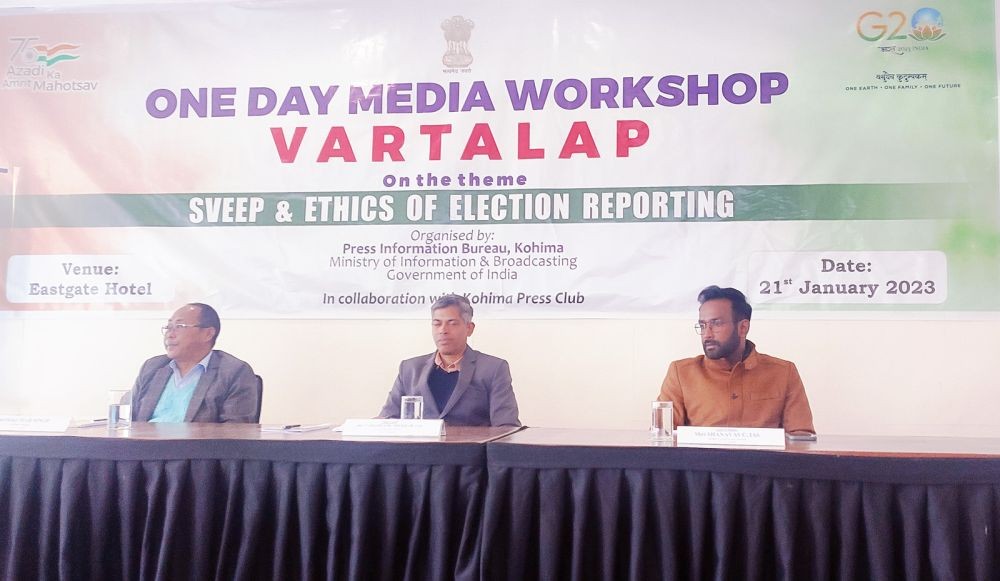(From left) K Sonikumar Singh, IIS, Assistant Director, PIB, Kohima; Chief Electoral Officer, V Shashank Shekhar, IAS; and Deputy Commissioner of Kohima, Shanavas C, IAS during the event on January 21. (Morung Photo)

Morung Express News
Kohima | January 21
Deputy Commissioner of Kohima, Shanavas C, IAS today said that while it is heartening to see citizens coming forward to participate in the electoral process, the voting percentage in Nagaland is “too high,” thereby posing a question as to whether the elections here are free and fair.
Speaking at the one day media workshop Vartalap on the theme ‘SVEEP & Ethics of Election Reporting’ at Eastgate Hotel, Kohima on Saturday, he emphasized that “free and fair election is not only the absence of any law and order issue” but ensuring that people are exercising their franchise to vote by themselves on their own will and conscience.
He said free and fair elections happen only when voters come forward on their own will, based on their conscience without any influence of liquor, money etc. The DC urged the gathering to introspect what exactly is going wrong and who is to blame. “Should the blame go to the government or should the blame go to the people or the politicians,” he questioned, while maintaining that “it is a collective responsibility.”
The DC further shared some of his own experiences with elections in Nagaland, where he encountered letters with decisions to make a family vote, as well as seeing very young voters carrying multiple voter cards.
“We made it normal for them because when it was happening we didn’t stop or advise or tell them it’s wrong or didn’t make them aware that it’s not how elections are done,” the DC said.
“We don’t have a system of transparency where these things come to light and we can take quick actions and we can take care of the culprits and we can actually advise the people that it is wrong”, he further pointed out. “There comes in the importance of media”, he stated while expressing that the “media's role is to do constructive criticism and ethical reporting in various situations and your reporting should not limit only to the poll date.”
He also termed the few villages that came forward, declaring that they will go with free and fair election as some “good practices” and “a very positive sign”.
However, pointing to the reality in Nagaland, he said, “we cannot just hide away from reality. The underplay and the undercurrents which happen in the state, only we know. If you don’t stop it right now, the vicious cycle will keep happening.” He said media persons can make a change. “You have the biggest sword— the pen in your hands.”
Terming the declaration of a few villages’ resolution for a free and fair election as a “very interesting development”, Chief Electoral Officer, V Shashank Shekhar, IAS pointed out that “when the villages pass resolutions like this, obviously there is a concern that this kind of things are happening in the society. That’s why resolution has happened.”
While terming such resolutions as a positive step towards free and fair elections, he hopeed that more villages will take up such resolutions. “Only when both sides including the government and all the stakeholders come together, we can hope for a free and fair election,” he stated. The CEO said that they would endeavour to ensure that every single eligible voter who wants to cast their votes should be able to vote.
During the technical session, Asangla Imsong, Joint Director, DIPR and Sharon Longchari, Joint CEO, Nagaland were the resource persons. They spoke on the topics ‘Checking misinformation especially in social media during elections’ and ‘Dos & Don’ts of Election reporting- An ECI perspective.’
Earlier, K Sonikumar Singh, IIS, Assistant Director, PIB, Kohima gave the welcome and keynote address during the inaugural session. The workshop was organised by the Press Information Bureau (PIB), Ministry of Information & Broadcasting Kohima, Nagaland.






